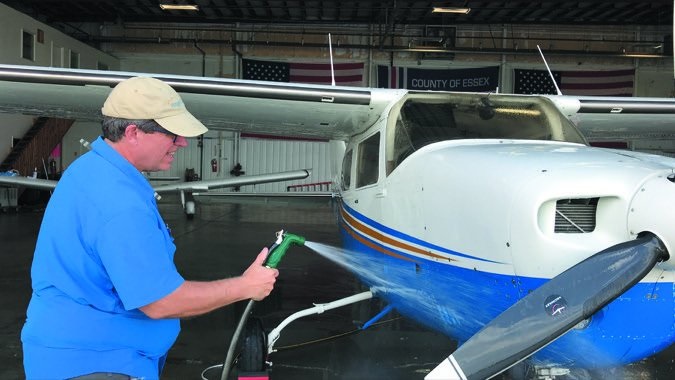10 Tips for Treating and Preventing Aircraft Corrosion

Corrosion of aircraft is a major concern in the aviation industry since it affects both the safety of aircraft and the length of time they can remain in service. Corrosion can be caused by the severe circumstances to which airplanes are subjected when they are being used, and this problem poses a substantial risk if it is not corrected as soon as it is discovered. This in-depth piece, will go into extremely specific and useful pointers for efficiently treating and avoiding aircraft corrosion, hence protecting the structural integrity and safety of these flying marvels.
1. Frequent Inspecting Of Facilities
Routine inspections are the first step in ensuring the safety of an aircraft. It is essential to do inspections thoroughly and consistently on a regular basis in order to ensure early detection of corrosion. Your inspection procedure ought to include not only visual checks but also methods of non-destructive testing like eddy current testing and ultrasonic testing, for example. This comprehensive approach can detect corrosion in its early stages, so avoiding it from developing into a more significant problem in the future.
2. Keeping A Tidy Appearance
The application of correct cleaning procedures greatly aids in the prevention of corrosion. During the flight, aircraft are frequently subjected to a bombardment of contaminants, such as dirt, filth, salt, and smog, which can be hazardous to the aircraft’s health. It is vital to use cleaning solutions and methods that have been certified for use in aviation if one wishes to effectively clean an aircraft without causing any damage to the exterior of the aircraft.
3. Coatings That Offer Protection
Consider using protective coatings on the areas of the aircraft that are susceptible to damage. These coatings perform the function of a formidable barrier, protecting the metal surfaces from the corrosive effects that are caused by external conditions. Coatings made of epoxy or polyurethane are quite popular and have proven to be very effective in protecting against corrosion.
4. Keeping Humidity Under Control
The amount of humidity present inside the aircraft has the potential to have a substantial impact on the corrosion process. Since elevated levels of humidity can speed up the corrosion process, it is essential to purchase dehumidifiers or other moisture control equipment. You can successfully reduce the risk of corrosion by ensuring that the appropriate humidity levels are maintained.
5. Take Immediate Action
It is imperative to take fast action upon discovering corrosion in order to prevent further damage. Isolate the afflicted region and begin treatment in order to stop the corrosion from spreading to other parts of the building. In order to ensure the appropriate management of the problem, it is recommended to seek the guidance of aviation maintenance professionals.
6. Abrasive Cleaning
In more severe instances of corrosion, abrasive cleaning methods may be required to remove the corrosion. But its not always necessary. Nevertheless, it is of the utmost importance to stress that this activity can only be carried out by well-qualified specialists. The aircraft’s surface may be permanently damaged if abrasive processes are performed incorrectly.
7. Agents That Prevent Corrosion
When an airplane is stored for extended periods, corrosion inhibitors are an absolute necessity. These inhibitors, when they condense on the surface of metals, form a layer of protection for the metals. As a direct consequence of this, the likelihood of corrosion developing is reduced. Using ACF-50 is an excellent preventative activity that can be conducted to protect the aircraft’s ability to remain in service for a longer period of time.
8. Cathodic Protection
When it comes to protecting airplanes from corrosion, cathodic protection systems are among the most effective methods. These systems use sacrificial anodes as a means of deflecting corrosion away from vital components in the system. They are an effective kind of protection. particularly for aircraft that are flown in environments where corrosion is prevalent.
9. Preventative Upkeep As Scheduled
It is absolutely non-negotiable that the aircraft manufacturer’s suggested stringent maintenance schedule be followed to the letter. Performing routine maintenance ensures that any possible corrosion issues are handled promptly and that the required steps are taken to prevent their reoccurrence in the future.
10. Institutions Of Higher Learning
One of the best investments you can make in reducing corrosion is in the training and education of your aviation personnel. The presence of knowledgeable staff allows for the possibility of proactive efforts being taken to reduce the risks of corrosion and the implementation of effective preventative measures. Your staff will constantly be knowledgeable about the newest methods and industry best practices for stopping corrosion. if you provide them with continuous training.
Conclusion
Corrosion of airplanes is a significant obstacle that calls for awareness and preventative actions to be taken. By sticking to these 10 really specific and useful pointers, you may greatly limit the risk of corrosion, ensuring that your aircraft will continue to be safe, operational, and structurally sound for a good number of years into the future.